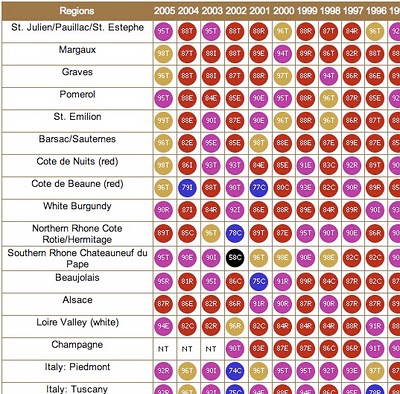Wednesday, November 30, 2011
Quit talking about yourself, and start being yourself (another social media lecture)
Most of you are creating noise. I follow tons of wineries, distributors and wine people in general. Most of you are selling, or trying to sell. Instead, you are selling out. Social media is the wrong medium for selling (directly). As a member of the community, your obligation is to show yourself or your brand as being candid and authentic. Be you. This is why you have followers, because people want to hear what you have to say. They want a rallying cry. They want your unedited opinion. They must already like you or your brand. It's the difference between selling cars and working in a restaurant. Cars, you have to make sure the customer doesn't leave, so you sell them on everything. In restaurants, they're already engaged, you don't need to sell them on how great your food is anymore. Your followers are already in your restaurant. Now that they're there, you have a chance to engage them, inspire them, humor them, or make them think. Nothing is more authentic or effective than you being you.
Wednesday, November 16, 2011
Escape or Contribute?

Growing up in Toledo, I was trained to say that "this town sucks", that "I can't wait to get out", "There's so much more to do in other cities". This was the anthem of the youth in the 80's (maybe today too, for all I know). Well, I got out. And I really enjoyed my time in California. And I got some perspective on the Midwest. Ohio remained, home. For several years, I had a conflicted perspective on how I felt about Ohio. I missed the little things, but I could never imagine myself placed back in the gray and gloomy backdrop, with the backwards culture, and depressing politics. Eventually, my desire to be surrounded by family got the best of me and I submitted, we returned.
Upon returning, I regretted the move almost immediately, I felt like, I had really overestimated how much I missed the place. Time went on, and the wine business worked pretty well for me here. I eventually discovered that, I wasn't alone. There were many talented, and experienced food and wine folks returning to their hometowns. The cost of living on the coasts and the relatively meager existence that this business sometimes offers made people grow up and re-calculate their life choices. Maybe it was the family heartstrings. These weren't people that failed in New York or Chicago and were now in their parents' basements, these were people that made a conscious decision to continue their career progressions in cities that weren't necessarily synonymous with food, wine or culture, but that they wanted to be a part of building that. What was seemingly a move of necessity or convenience has turned into reverse migration with a noble common purpose, to make the most of what we're given.
I'm not going to delve too deeply into why we felt that the big city held the life satisfaction. We all agree that there is no shortage of things to do, or culture in the biggest of cities. While that may be what lights your fire, I'm here to tell you that the Midwest, and certainly my little corner of it has something that the big cities have a hard time offering-chance to build something together.
Thanks in large part to a litany of chefs from Cleveland returning to their roots, and hometowns in the last dozen or so years after success in L.A, Chicago and New York, Cleveland has undergone a Food and Wine Renaissance quite unlike any American City I can think of. The national food media has begun to pay attention. That idea that we, as Ohioans, or Michiganders (cue the Chrysler Eminem commercial), can get together with our friends and families and with a twinkle in our eye and with the nearly forgotten histories of what our cities were like long before we were born, make this, our homes and hometowns, the place that satisfies our wanderlust. Bring the proverbial Mountain to Mohammed.
This movement is not limited to chefs. Living in the breadbasket of America, we grow stuff, and the growers have all changed. We now have cheese-makers, dairy farms that follow their own strict guidelines, cattle, hog and chicken farmers raising free range, naturally fed livestock, and entire markets devoted to nothing but locally grown and produced products. The Midwest as an artisan mecca is becoming a reality. People that left or would have left a dozen years ago are opting to be a part of the movement here at home.
I've seen varying levels of this movement in all of the major cities I call on, whether it's Detroit, with the incredible ethnic food and underground wine and supper clubs or Cleveland with the Celebrity chef fueled downtown and surrounding neighborhood reinvention to Cincinnati and Columbus's burgeoning food scenes, change is happening right here, right now. I say this with all sincerity- I've never been more professionally satisfied or inspired than I am right here, right now.
Thursday, November 3, 2011
There are no "bear and bull" vintages

Thanks to Global warming and modern winemaking techniques, we have fewer poor vintages than in the past. We also seem to have more of the "great" vintages handed to us as well. I touched on this before. Time has passed, and now, I have dealt with the 2008 Rhone fallout.
The Southern Rhone has experienced a string of easy vintages. In the last 10 years they have had 9, really great years. With the consensus exception of the 2002 vintage, they were all vintages worth buying. The 2008, sandwiched between the 93pt-2009 Vintage and the 98pt-2007 vintage (heavily overrated in my opinion), received a measly 86 points. Looking down to the bottom of the erobertparker page, that translates to "very good to excellent". I agree, completely. 2008 was a good vintage. The wines are generally very good. This was not the vintage of the century, but I thought it was very much like the classic 2006 vintage, which scored lower than the 2005 (90 vs. 95pts), but has proven to be a better and more age-able wine. Warmer vintages tend to get higher scores, and show well younger, but don't seem to hold up as well, generally.
It is within every wine buyer's nature to buy when the vintage is good and pass when it's not. It is their responsibility to buy selectively and in the best interest of their clientele. The other force, the wineries and the wholesalers, say that they have wine to sell from the vintages that are not as well received. This creates a logjam and in many cases, creates turmoil for the brands. Wholesalers and wineries plead with the retailers to keep buying in and out of the vintages and sometimes try to tie next year's allocations to the purchase of the "off" vintage. This usually just creates ill will.
Back to the Rhone problem. I have dealt with many, many buyers that were passing on the 2008 vintage because it wasn't very good. Parker thought it was good, just not as good as the surrounding vintages. We have now created a wine buying society that takes these cheat sheets and mistakes this for being savvy, at the expense of the very producers that they covet in the great vintages (which seem to happen 8 of every 10 years). I had these buyers passing on the 2008's, tasting them and agreeing they were great, but that they would be a tough sell. I don't want to marginalize the impact a consumer with just enough information to be dangerous can have on your sales. These vintage charts made a fair amount of sense in 1970, when you didn't really know if you should buy the 1966, 1967, or 1963 vintage of Chambolle Musgny for $18. For the record, they were all bad years-see how much times have changed? It is these pocket vintage charts plus the expectations of 94pt vintages every year that are dampening our collective sales.
It would seem that a compromise is available. When a less than 95-point vintage comes along, there must be a way for a retailer to explain to the consumer that they "hand select" each of the wines from these "off" vintages. This could potentially offer some killer deals for the consumer as many Old world wineries discount these vintages to move through them. This is the buying savvy that we all need.
Subscribe to:
Comments (Atom)









